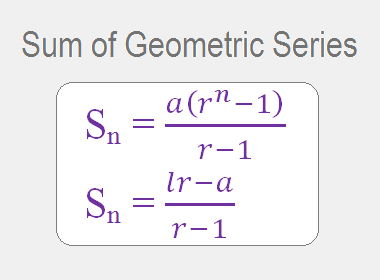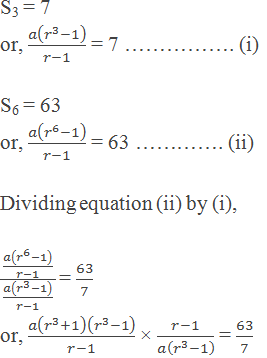
The series associated with a geometric sequence is known as a
geometric series. For example, 2 + 4 + 8 + 16 + 32 is the geometric series
associated with the geometric sequence 2, 4, 8, 16, 32.
Let a be the first term, r be the common ratio, n be the number
of terms, l be the last term and Sn be the sum to n terms of GS, then
Sn = a + ar + ar2 + … … … + arn-2
+ arn-1 ………. (i)
Multiplying both sides by r,
rSn = ar + ar2 + ar3 + … … … +
arn-1 + arn …….. (ii)
Subtracting (i) from (ii), we get
(r – 1)Sn = -a + arn
![∴ Sn = a(r^n-1)/(r-1) Again, Sn = (ar^n-a)/(r-1) or, Sn = (ar^(n-1).r-a)/(r-1) or, Sn = (lr-a)/(r-1) [∵ l = arn-1] ∴ Sn = (lr-a)/(r-1)](https://blogger.googleusercontent.com/img/b/R29vZ2xl/AVvXsEjSeV9lkD_KonLBU8mWPs86zkCeaxZNI3i7i1D3ktYamGYtyv5Q2pa3O44XHKU3PiBitcjFGo02SthpPnM6yQ2lNgHTd_Erjrea6FFB5p1yCVptmvdS2q1s950Afygt0ItTppic3BGpmH9p1uspXLTomDHNULFV8_cYaeVLSl9u7xNNcnO4j3pZlrbAjw/s16000/formula%20Sn%20for%20GS.png)
********************
10 Math Problems officially announces the release of Quick Math Solver and 10 Math Problems, Apps on Google Play Store for students around the world.
********************
********************
Worked Out Example
Example 1: Find the sum of the geometric series 1 + 2 + 4 + … … … 7 terms.
Solution:
Here,
First term (a) = 1
Common ratio (r) = 2/1 = 2
Number of terms (n) = 7
Sum of the terms (Sn) = ?
By using formula,

∴ Sn = 127
Example 2: In a GP, the first term is 7, the last term is 448 and the sum is
889, find the common ratio.
Solution:
Here,
First term (a) = 7
Last term (l) = 448
Sum of terms (Sn) = 889
Common ratio (r) = ?
By using the formula,

∴ The common ratio is 2.

Solution:
Here,

= 32 + 33 + 34 + 35
+ 36
= 9 + 27 + 81 + 243 + 729
= 1089
Example 4: How many terms of the series 32 + 48 + 72 + … … will add upto 665?
Solution:
Here,
First term (a) = 32
Common ratio (r) = 48/32 = 3/2
Sum of terms (Sn) = 665
Number of terms (n) = ?
By using formula,

∴ n = 6
∴ The number of terms = 6
Example 5: If S3 and S6 of a GS are 7 and 63
respectively, find the common ratio.
Solution:
Here,

or, r3 = 9 – 1
or, r3 = 8
or, r3 = 23
or, r = 2
∴ Common ratio = 2
Example 6: The second and fifth terms of GS are 3 and 81 respectively. Find the
sum of the first five terms.
Solution:
Here,
The second term of GS is 3
i.e. t2 = 3
or, ar = 3
Again, the fifth term of GS is 81
i.e. t5 = 81
or, ar4 = 81
or, ar.r3 = 81
or, 3.r3 = 81
or, r3 = 81/3
or, r3 = 27 = 33
or, r = 3
And, ar = 3
or, a×3 = 3
or, a = 1
Now,

Example 7: Find the GP for which the sum of the first two terms is -4 and the
fifth term is 4 times the third term.
Solution:
Here,
S2 = -4
i.e. t1 + t2 = -4
or, a + ar = -4
or, a(1 + r) = -4 ……………… (i)
t5 = 4 × t3
i.e. ar4 = 4 × ar2
or, r2 = 4
or, r = ±2
Taking r = 2, from equation (i), we have
a(1 + 2) = -4
or, a = -4/3
The GP is a, ar, ar2, …
i.e. -4/3, -4×2/3, -4×22/3, …
i.e. -4/3, -8/3, -16/3, …
Taking r = -2, from equation (i), we have
a(1 – 2) = -4
or, a = 4
The GP is a, ar, ar2, …
i.e. 4, 4×-2, 4×(-2)2, …
i.e. 4, -8, 16, …
Example 8: If the sum of the first three terms of a GP is 1 and the sum of the
first six terms is 28. Find the sum of the first 9 terms of the series.
Solution:
Here,

or, r3 = 28 – 1
or, r3 = 27
or, r3 = 33
or, r = 3

∴ The sum of first 9 terms is 757.



0 comments: